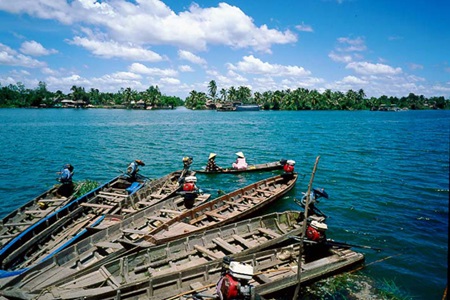Ensuring water security is believed to be not only imperative but also a long-term mission for the sustainable development of Viet Nam.

Photo shows a stretch of Cuu Long River in the Mekong Delta. — Photo tinnhanhdiaoc.vn
It was also a challenge, Deputy Prime Minister Hoang Trung Hai said at the international conference of "water security in a changing era" held by the Ministry of Natural Resources and Environment on Oct.18th in Ha Noi.
Hai said that the impact of climate change and shortcomings in policies for sustainable development were blamed for threatening national water security.
Climate change has caused a decline of river water and underground water. In the first months of this year, a severe drought has hit the central region. As forecast, drought is predicted to be more severe in 2016, he said.
Tong Ngoc Thanh, head of the National Centre for Water Resources Planning and Investigation said on the sideline of the conference that underground water in both the deltas of Red (Hong) River and Mekong (Cuu Long) River were rapidly declining now partly due to over-exploitation.
And the quality of surface water in international rivers that we share with other countries in the region also showed symptoms of degrading, he said.
Statistics from the Ministry of Natural Resources and Environment figured out Viet Nam now has around 840 billion cubic metres of surface water, up to 60 per cent of which originates in foreign countries upstream.
"Thus, it really poses a threat of lacking surface water for our country," he said.
Thanh said the centre planned to conduct surveys to assessing water resources throughout the country, especially in the Red and Mekong river basins.
Based on the surveys, a master plan for monitoring water resources exploitation would be compiled, he said.
To reach the target of ensuring water security for national sustainable development in the near future, Deputy Prime Minister Hai assigned relevant agencies several tasks.
He said it should perfect the policy system related to water resources, strengthen international co-operations with the countries sharing the same water resources, apply advanced technologies in water resource management as well as educate people to economically use water.